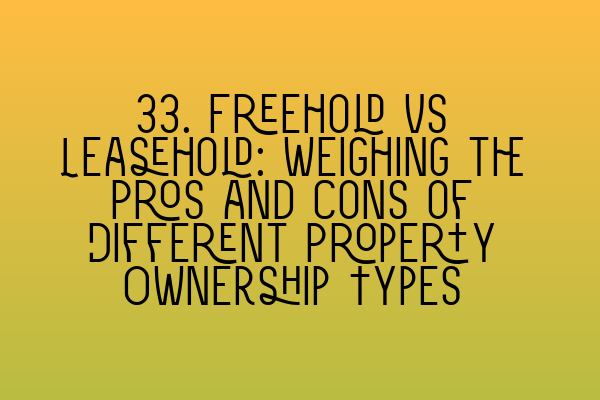33. Freehold vs Leasehold: Weighing the Pros and Cons of Different Property Ownership Types
When it comes to property ownership, there are two main types to consider: freehold and leasehold. Each type has its own set of pros and cons, which can significantly impact your decision-making process when buying or selling property. In this blog post, we will delve into the differences between freehold and leasehold, weighing their advantages and disadvantages to help you make an informed choice.
Freehold Ownership:
Freehold ownership, also known as fee simple ownership, grants you complete ownership of the property and the land it stands on. As a freeholder, you have full control over your property and can make any changes or alterations without seeking permission from anyone else. You also have the advantage of not having to pay ground rent or service charges like leaseholders do. This type of ownership offers stability and unrestricted use of the property.
Pros of Freehold Ownership:
1. Absolute Control: You have the freedom to modify, renovate, or extend your property as you see fit, without obtaining consent from a landlord or any other party.
2. Long-term Investment: Freehold property is considered a long-term investment, as it retains its value over time and can be passed down to future generations.
3. Potential for Development: With freehold ownership, you have the opportunity to develop your property, which can increase its value.
4. No Ground Rent or Service Charges: Unlike leasehold ownership, freehold ownership does not require you to pay ground rent or service charges to any third party.
Cons of Freehold Ownership:
1. Higher Initial Costs: Freehold property tends to be more expensive upfront compared to leasehold property due to the added benefits it offers.
2. Responsibility for All Repairs: As a freeholder, you are responsible for all repairs and maintenance of the property, which can be costly and time-consuming.
3. Limited Shared Facilities: Freehold properties may not have access to shared facilities or amenities, which could be a disadvantage in certain cases.
Leasehold Ownership:
Leasehold ownership grants you the right to occupy a property for a fixed period of time, as specified in the lease agreement. While you essentially possess the property, the land itself remains under the ownership of the freeholder. As a leaseholder, you are bound by certain restrictions and obligations outlined in the lease, which may include paying ground rent, service charges, and obtaining consent for alterations.
Pros of Leasehold Ownership:
1. Lower Initial Costs: Leasehold properties generally have lower upfront costs compared to freehold properties, making them more accessible to buyers with limited budgets.
2. Shared Amenities: Leasehold properties often come with shared amenities such as gardens, parking spaces, or communal areas, enhancing the overall living experience.
3. Limited Repairs and Maintenance: Leaseholders typically have limited responsibility for major repairs and maintenance, as these are the responsibility of the freeholder.
4. Professional Management: Leasehold properties usually benefit from professional management provided by a managing agent, ensuring the smooth running of communal areas and resolving any disputes.
Cons of Leasehold Ownership:
1. Lease Length and Extension Costs: The lease length may decrease over time, affecting the value of the property and potentially making it difficult to obtain a mortgage. Extending the lease can be costly and involve complex legal processes.
2. Ground Rent and Service Charges: Leaseholders are obligated to pay ground rent and service charges, which could increase over time and impact the affordability of the property.
3. Restrictions and Permissions: Leaseholders must seek permission from the freeholder for alterations or changes to the property, which can be time-consuming and subject to additional costs.
4. Lack of Control: Leasehold ownership limits your control over the property, as you must adhere to the terms of the lease agreement and seek approval for certain actions.
Conclusion:
Choosing between freehold and leasehold ownership depends on your personal preferences, financial situation, and long-term goals. While freehold ownership offers complete control and no additional fees, it also comes with added responsibilities and higher upfront costs. On the other hand, leasehold ownership provides affordability and convenience, but it involves restrictions and ongoing expenses.
Consider engaging the services of a property law solicitor to guide you through the complex legal aspects of property ownership. They can explain the terms and conditions of lease agreements, advise you on potential pitfalls, and help you make an informed decision based on your specific circumstances.
At SQE Property Law & Land Law, we offer comprehensive legal services to assist you in all your property-related matters. Whether you’re buying, selling, or leasing property, our experienced team can provide expert advice and guidance to ensure a smooth and successful transaction.
If you’re preparing for the SQE exams, check out our related articles on SQE 1 practice exam questions, SQE 1 practice mocks FLK1 FLK2, SQE 2 preparation courses, SQE 1 preparation courses, and SRA SQE exam dates to help you succeed in your legal career.
Contact SQE Property Law & Land Law today to learn more about our services and how our team can assist you with your property law needs.
